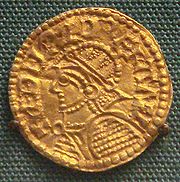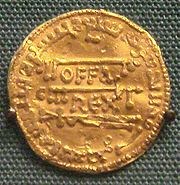
Mancus
Encyclopedia

Gold coin
A gold coin is a coin made mostly or entirely of gold. Gold has been used for coins practically since the invention of coinage, originally because of gold's intrinsic value...
, a weight of gold of 4.25g (equivalent to the Islamic dinar
Dinar
The dinar is the official currency of several countries.The history of the dinar dates to the gold dinar, an early Islamic coin corresponding to the Byzantine denarius auri...
, and thus lighter than the Byzantine solidus
Solidus (coin)
The solidus was originally a gold coin issued by the Romans, and a weight measure for gold more generally, corresponding to 4.5 grams.-Roman and Byzantine coinage:...
), or a unit of account of thirty silver
Silver
Silver is a metallic chemical element with the chemical symbol Ag and atomic number 47. A soft, white, lustrous transition metal, it has the highest electrical conductivity of any element and the highest thermal conductivity of any metal...
pence
Penny
A penny is a coin or a type of currency used in several English-speaking countries. It is often the smallest denomination within a currency system.-Etymology:...
. This made it worth about a months wages for a skilled worker, such as a craftsman or a soldier. Distinguishing between these uses can be extremely difficult: the will of the Anglo-Saxon
Anglo-Saxons
Anglo-Saxon is a term used by historians to designate the Germanic tribes who invaded and settled the south and east of Great Britain beginning in the early 5th century AD, and the period from their creation of the English nation to the Norman conquest. The Anglo-Saxon Era denotes the period of...
king Eadred, who died in 955
955
Year 955 was a common year starting on Monday of the Julian calendar.- Europe :* August 10 – Battle of Lechfeld: Otto I the Great defeats the Magyars, halting their westward expansion and ending the threat to Germany.* Eadwig becomes King of England.- Religion :* December 16 – Pope...
, illustrates the problem well with its request that 'two-thousand mancuses be taken and minted into mancuses' (nime man twentig hund mancusa goldes and gemynetige to mancusan).
Origin and development
The origin of the word mancus has long been a cause of debate. One suggested interpretation linked it to the LatinLatin
Latin is an Italic language originally spoken in Latium and Ancient Rome. It, along with most European languages, is a descendant of the ancient Proto-Indo-European language. Although it is considered a dead language, a number of scholars and members of the Christian clergy speak it fluently, and...
adjective mancus, meaning 'defective', which was thought to be a reference to the poor quality of gold coinage circulating in eighth-century Italy
Italy
Italy , officially the Italian Republic languages]] under the European Charter for Regional or Minority Languages. In each of these, Italy's official name is as follows:;;;;;;;;), is a unitary parliamentary republic in South-Central Europe. To the north it borders France, Switzerland, Austria and...
. However, it has become clear that the earliest references to payments in mancuses, which occur in north-eastern Italy in the 770s, specifically refer to Islam
Islam
Islam . The most common are and . : Arabic pronunciation varies regionally. The first vowel ranges from ~~. The second vowel ranges from ~~~...
ic gold dinar
Dinar
The dinar is the official currency of several countries.The history of the dinar dates to the gold dinar, an early Islamic coin corresponding to the Byzantine denarius auri...
s. Consequently, a second theory is probably correct: that mancus derives from the Arabic word منقوش (from the triliteral verbal root n-q-sh 'to sculpt, engrave, inscribe'), which was often employed in a numismatic context to mean 'struck'.

798
Year 798 was a common year starting on Monday of the Julian calendar. The denomination 798 for this year has been used since the early medieval period, when the Anno Domini calendar era became the prevalent method in Europe for naming years.- Europe :* Coenwulf of Mercia invades Kent, deposes and...
to King Coenwulf of the Mercia
Mercia
Mercia was one of the kingdoms of the Anglo-Saxon Heptarchy. It was centred on the valley of the River Trent and its tributaries in the region now known as the English Midlands...
ns by Pope Leo III
Pope Leo III
Pope Saint Leo III was Pope from 795 to his death in 816. Protected by Charlemagne from his enemies in Rome, he subsequently strengthened Charlemagne's position by crowning him as Roman Emperor....
mentions a promise made in 786
786
Year 786 was a common year starting on Sunday of the Julian calendar. The denomination 786 for this year has been used since the early medieval period, when the Anno Domini calendar era became the prevalent method in Europe for naming years.- By place :Byzantine Empire* A council is organized in...
by King Offa
Offa
Offa may refer to:Two kings of the Angles, who are often confused:*Offa of Angel , on the continent*Offa of Mercia , in Great BritainA king of Essex:*Offa of Essex A town in Nigeria:* Offa, Nigeria...
to send 365 mancuses to Rome
Rome
Rome is the capital of Italy and the country's largest and most populated city and comune, with over 2.7 million residents in . The city is located in the central-western portion of the Italian Peninsula, on the Tiber River within the Lazio region of Italy.Rome's history spans two and a half...
every year. Use of the term mancus was at a peak between the ninth and eleventh centuries, and was only restricted to very specific locations and contexts thereafter.
The number of actual gold coins circulating in the west that would have been termed mancuses is difficult to calculate. Because of their high value such coins were less likely than other pieces to be lost, whilst the rarity of gold and its close relationship to bullion meant that coins were often melted down for re-use. Indeed, many gold coins minted in the west between the eighth and thirteenth centuries were struck in small numbers with a specific purpose in mind, and probably did not circulate commercially in quite the same way as silver coins. In many cases they had strong associations with specific issuing authorities such as a king (e.g., Coenwulf of Mercia
Mercia
Mercia was one of the kingdoms of the Anglo-Saxon Heptarchy. It was centred on the valley of the River Trent and its tributaries in the region now known as the English Midlands...
), emperor (like Louis the Pious
Louis the Pious
Louis the Pious , also called the Fair, and the Debonaire, was the King of Aquitaine from 781. He was also King of the Franks and co-Emperor with his father, Charlemagne, from 813...
) or archbishop (e.g., Wigmund
Wigmund
Wigmund was a medieval Archbishop of York.Wigmund was consecrated in 837 and died in 854.-External links:*...
of York
York
York is a walled city, situated at the confluence of the Rivers Ouse and Foss in North Yorkshire, England. The city has a rich heritage and has provided the backdrop to major political events throughout much of its two millennia of existence...
). On the other hand, they might not reference any king at all, and may relate to the issuing city (e.g., Chartres
Chartres
Chartres is a commune and capital of the Eure-et-Loir department in northern France. It is located southwest of Paris.-Geography:Chartres is built on the left bank of the Eure River, on a hill crowned by its famous cathedral, the spires of which are a landmark in the surrounding country...
) or moneyer
Moneyer
A moneyer is someone who physically creates money. Moneyers have a long tradition, dating back at least to ancient Greece. They became most prominent in the Roman Republic, continuing into the empire.-Roman Republican moneyers:...
(like Pendred and Ciolhard at London
London
London is the capital city of :England and the :United Kingdom, the largest metropolitan area in the United Kingdom, and the largest urban zone in the European Union by most measures. Located on the River Thames, London has been a major settlement for two millennia, its history going back to its...
under Offa). Some gold pieces were simply struck from regular silver dies. In addition to these gold pieces with meaningful inscriptions issued in the west, there circulated some genuine Arabic dinars and imitations of them. Curiously, several of these imitative dinars—including the famous example bearing the name of Offa of Mercia—are based on originals struck in the year 157 AH (773
773
Year 773 was a common year starting on Friday of the Julian calendar. The denomination 773 for this year has been used since the early medieval period, when the Anno Domini calendar era became the prevalent method in Europe for naming years.- Europe :* At request of the Pope Adrian I, Charlemagne...
or 774
774
Year 774 was a common year starting on Saturday of the Julian calendar. The denomination 774 for this year has been used since the early medieval period, when the Anno Domini calendar era became the prevalent method in Europe for naming years.- Europe :* Charlemagne conquers the kingdom of the...
AD). The precise significance of this remains uncertain: it may be that careful copies of a coin of this year circulated widely, or that particularly many dinars of this year entered the west for some reason.
For all that the surviving western specimens of early medieval gold coins must represent only a tiny proportion of the original stock, it must be borne in mind that before the thirteenth century gold coins were extremely rare in western Europe: in England
England
England is a country that is part of the United Kingdom. It shares land borders with Scotland to the north and Wales to the west; the Irish Sea is to the north west, the Celtic Sea to the south west, with the North Sea to the east and the English Channel to the south separating it from continental...
, for instance, only eight native gold pieces with meaningful legends are known from c. 650 to 1066, which can be complemented by finds from the same period of half a dozen Arabic gold and perhaps ten Carolingian
Carolingian
The Carolingian dynasty was a Frankish noble family with origins in the Arnulfing and Pippinid clans of the 7th century AD. The name "Carolingian", Medieval Latin karolingi, an altered form of an unattested Old High German *karling, kerling The Carolingian dynasty (known variously as the...
gold pieces or imitations of them. Substantial and regular production of gold coinage only resumed in the thirteenth century.

